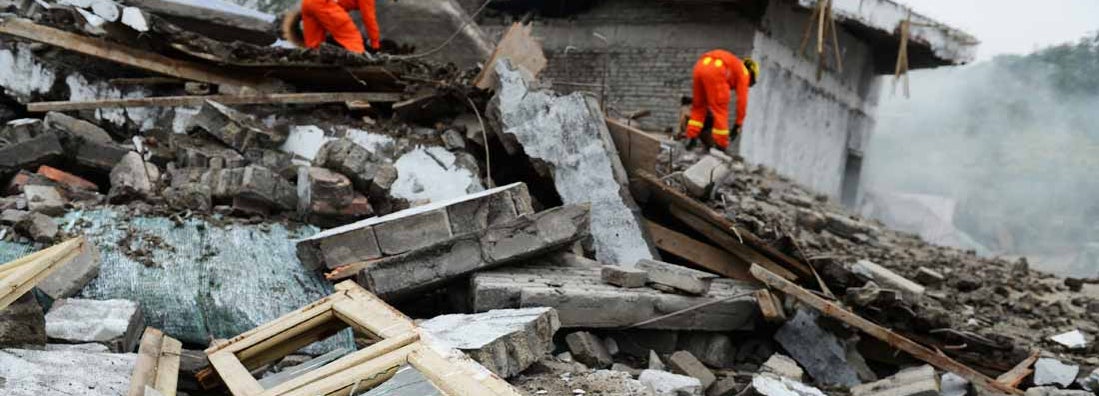Alabama Earthquake Insurance
Find the right earthquake insurance policy for you.

When you think earthquakes, states like California come to mind, with images of bridges swaying and highways collapsing. However, the East Coast still gets earthquakes, just not as often. While this may seem nice, the earthquakes that do happen in Alabama and around the East Coast tend to radiate farther, due to the rock they sit on.
Geologists suspect that the East Coast's rock is older and more solid than on the West Coast, meaning that earthquakes are fewer in number, but tend to expand further than those on the West Coast. Additionally, with the increased number of older homes, the damages can be severe. One of the only ways to protect your assets and your Alabama home from the financial damage of an earthquake is to purchase earthquake insurance.
Use our independent agent matching system to find the best insurance plan in your area. You tell us what you’re looking for, and our technology will recommend the best agents for you. Any information you provide will be sent to only the agents you pick. We do not sell to third parties.
Alabama Earthquake Facts
- On April 29, 2003, there was a 4.6 magnitude earthquake in Alabama.
- The largest earthquake in Alabama, in 1916, was estimated to be a 5.1 magnitude earthquake, causing severe damage.
- Most earthquakes in Alabama occur in the Southern Appalachian Seismic Zone (in northern and central Alabama) and the Bahamas Fracture Seismic Zone (in southern Alabama).
Earthquakes are mysterious and can happen at any time, which makes them especially terrifying. There are earthquakes every day in the United States, although most of them cannot be felt.
Being prepared for an earthquake is important for everyone. Educating yourself on how to gather earthquake preparation supplies, along with having an emergency plan for when a quake strikes, is crucial. But even with the best preparation, damage can still happen. That's why having earthquake insurance is important. Just like a first aid kit, when you need it, it comes in very handy and may save your financial life.
What is Earthquake Insurance?
Earthquake insurance is a set of policies put in place to protect you from the risks associated with an earthquake. While this insurance is not required by law, it is a wise investment for homeowners in AL. Additionally, many homeowners believe that their homeowners insurance policy covers damage from earthquakes, although that is most likely not the case. Most homeowners insurance policies do not cover earthquake damage, so you must purchase the policy separately.
What Does Earthquake Insurance Cover in Alabama?
An earthquake insurance policy is added to existing policies and serves as additional coverage. It's commonly known as a policy rider. A typical earthquake insurance policy rider may cover the following:
- Dwelling: This policy covers the entire home, along with any attached garages, shops, or additions.
- Detached structures: If you have buildings that aren't attached to your home, such as a pool house, storage shed, or greenhouse, this policy can help cover those from earthquake damage.
- Contents: Every homeowner has assets they want to protect from damage, such as antique furniture, heirlooms, artwork, or electronics. This policy can work to cover those items from damage.
- Extra liability insurance: If someone is injured on your property during an earthquake, you may be held liable for damages. Extra liability insurance can help protect you from legal costs and fees.
Additionally, one other perk to earthquake insurance is that the coverage extends to events like mudslides, tremors, and even sinkholes.
How Much Will an Earthquake Insurance Quote Be in Alabama?
Earthquake insurance prices vary depending upon your individual situation. When you're shopping for earthquake insurance quotes in Alabama, be sure to have the following information available:
- Home location
- Any attached/detached structures you wish to cover
- Age of home
- Building materials
- Contents value
- History of claims
- Any additions/upgrades you've made to the home
These are just a few of the basic facts your insurance agent will want to know in order to give you an accurate quote. Earthquake insurance is typically affordable, but many homeowners do not carry it. For example, only 12% of California residents have earthquake insurance, which leaves them without assistance if an earthquake damages their home or belongings. Additionally, older homes are much more susceptible to earthquake damage. Homes built before the late 1970s typically suffer more damage than their earthquake-ready counterparts.
Are There Discounts Available on Earthquake Insurance in Alabama?
Just like the majority of insurance policies, earthquake insurance has discounts available for you. Below is a list of popular discounts on earthquake insurance:
- Multi-policy discount
- New customer discount
- Loyal customer discount
- Claims-free discount
- Industry affiliation discount
Each insurance company offers its customers different discounts, so be sure to ask your agent which discounts you're eligible for.
How Do I Get Earthquake Insurance in Alabama?
When it comes to protecting your home and personal property from earthquake damage, it's critical to get a variety of quotes before choosing, so you can get the best quote at the right price. Our independent insurance agents are always available to help you discuss coverage options, suggest policies, or even help you file a claim.
